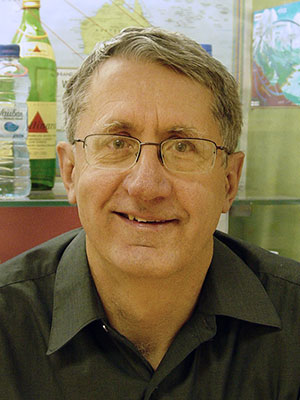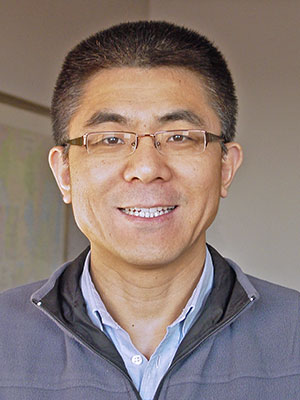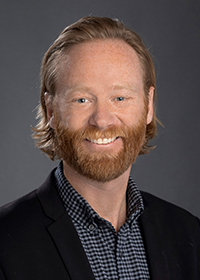The Hydrogeology Group examines the quality and quantity of water resources in the world today with emphasis on solving the environmental problems caused by ever-increasing human stress on hydrolic systems.
Dr. Tim Grundl, Professor

Specializing in groundwater contamination, contaminant fate and transport, and regional scale aquifer dynamics.
Research: I am currently involved in multiple lines of inquiry. The first is a comprehensive look into the overall geochemistry of the deep sandstone aquifer in eastern Wisconsin and the upper Midwest in general. This aquifer is the pre-eminent source of groundwater within Wisconsin and Illinois. The resource is being over utilized and is coming under increasingly severe stress. The last of the Pleistocene ice advances injected a large pulse of fresh Pleistocene water into this aquifer. Glacial-groundwater interplay is of great interest to glaciologists and hydrologists alike and has water supply implications as this water is “mined” for drinking water.
Another aspect of this work is a study of the shallow aquifer in southeastern Wisconsin to ascertain what effects would occur if treated effluent, complete with a high chloride load and a variety of emerging contaminants is used to recharge the aquifer. We are currently exploring several geochemical indicators to discriminate between recharge that contains treated effluent and recharge impacted by road salt.
A third line of inquiry is the development, in collaboration with other colleagues, of a suite of in-situ probes for the rapid, screening level detection of contamination in harbor sediments. Sediment borne contamination is the major source of contaminants to the surface waters of the United States. Remediation efforts would be much more focused and inexpensive if a better means to initially characterize the extent of contamination was employed. Current techniques depend on expensive networks of discrete sampling sites that can be 100s to 1000s of meters apart. Our probes allow real-time identification of PAH and heavy metal contamination in harbor sediments for a fraction of the effort involved in the typical coring and subsequent lab analysis that is in use today.
Dr. Shangping Xu, Associate Professor
Specializing in colloid filtration in both saturated and unsaturated soil; transport and fate of colloid-bound emerging contaminants on a watershed scale; as well as behavior and toxicity of nanoparticles in the environment.

Research: My primary research interest lies in the protection of water resources and the supply of safe drinking water. Anthropogenic activities have profoundly altered the hydrological cycle and water qualities on local, regional and global scales. My research group aims at improving our understanding of the transport and fate of colloid-sized particles (mineral particles, particulate organic matter, bacteria and protozoa) as well as colloid-bound contaminants in both natural subsurface environments and engineered systems (i.e. drinking water treatment facility). Our current research projects include:
- Steric trapping of colloid-sized particles in physically and chemically heterogeneous porous media.
- Filtration behavior of pathogenic bacteria in both saturated and unsaturated porous media.
- Transport and fate of colloid-bound emerging contaminants on a watershed scale.
- Roles of wetland systems in flood control and water quality improvement.
- Behavior and toxicity of nanoparticles in the environment.
- Innovative techniques for drinking water purification and wastewater treatment.
Dr. Charles Paradis, Assistant Professor

Specializing in fate, transport, and remediation of contaminants in the environment; mobility of redox-sensitive radionuclides and metals in groundwater; field-based tracer experiments for characterization of hydraulic parameters and processes; method development for conducting and interpreting data from single-well push-pull tests.
Research: My research is typically experimental, field based, and focused on water quality. However, since joining the faculty at UWM in 2019, I have focused on experimental research that is lab based and includes batch sorption and one-dimensional flow through column tests with groundwater tracers in various types of natural and engineered granular and fractured media. I have recently gained a strong interest in virus transport in groundwater due to the often mysterious occurrences of human and animal enteric viruses in deep and confined aquifers; how did they get there? I have in the past and will likely continue to conduct research on the mobility of uranium in groundwater by working with the United States Department of Energy’s Office of Legacy Management, Los Alamos National Lab, and Oak Ridge National Lab. One of the biggest challenges with uranium-contaminated groundwater is understanding and predicting the mobility of uranium as a function of geochemical parameters such as: pH, alkalinity, organic carbon, and mineralogy. I encourage potential graduate students and post-docs to contact me directly via e-mail or phone if they are interested in joining my research group at UWM.